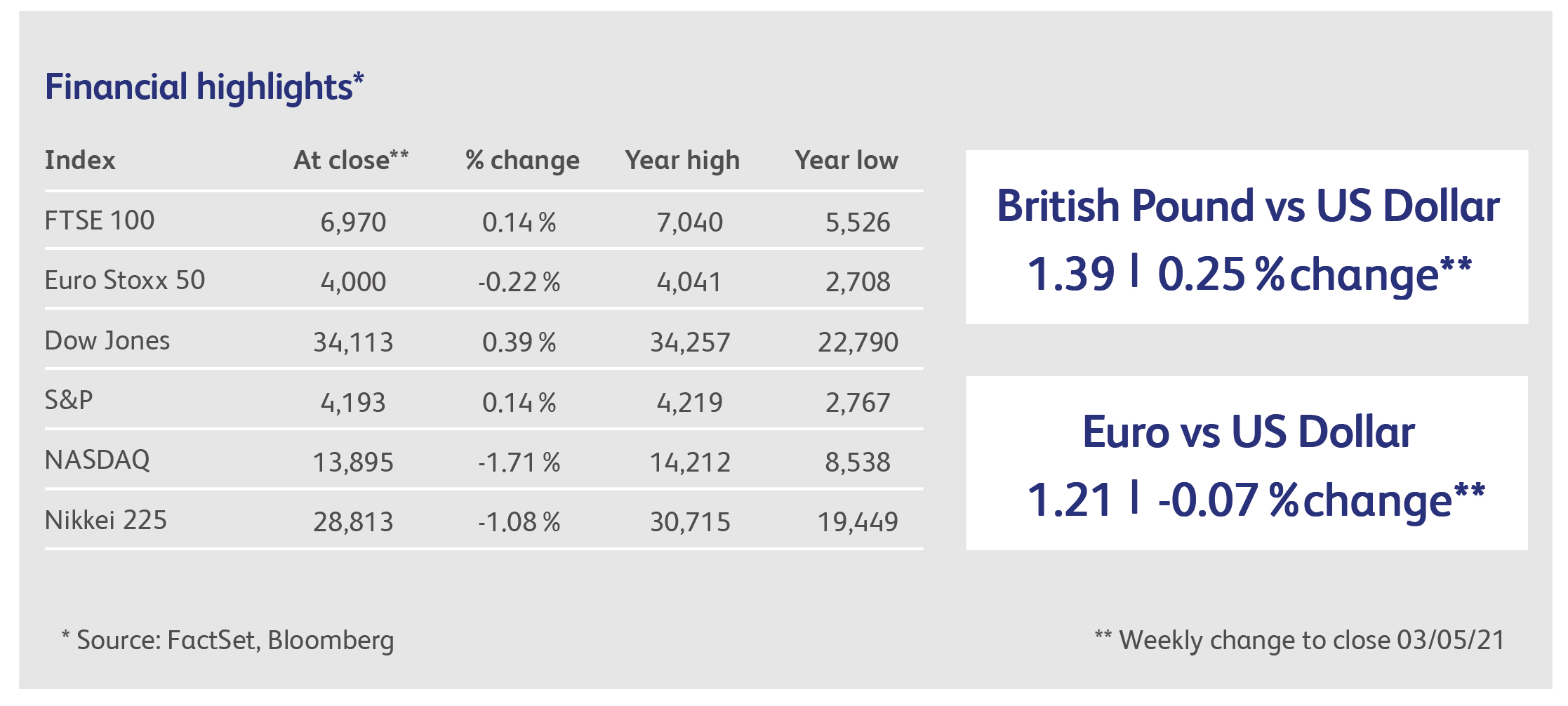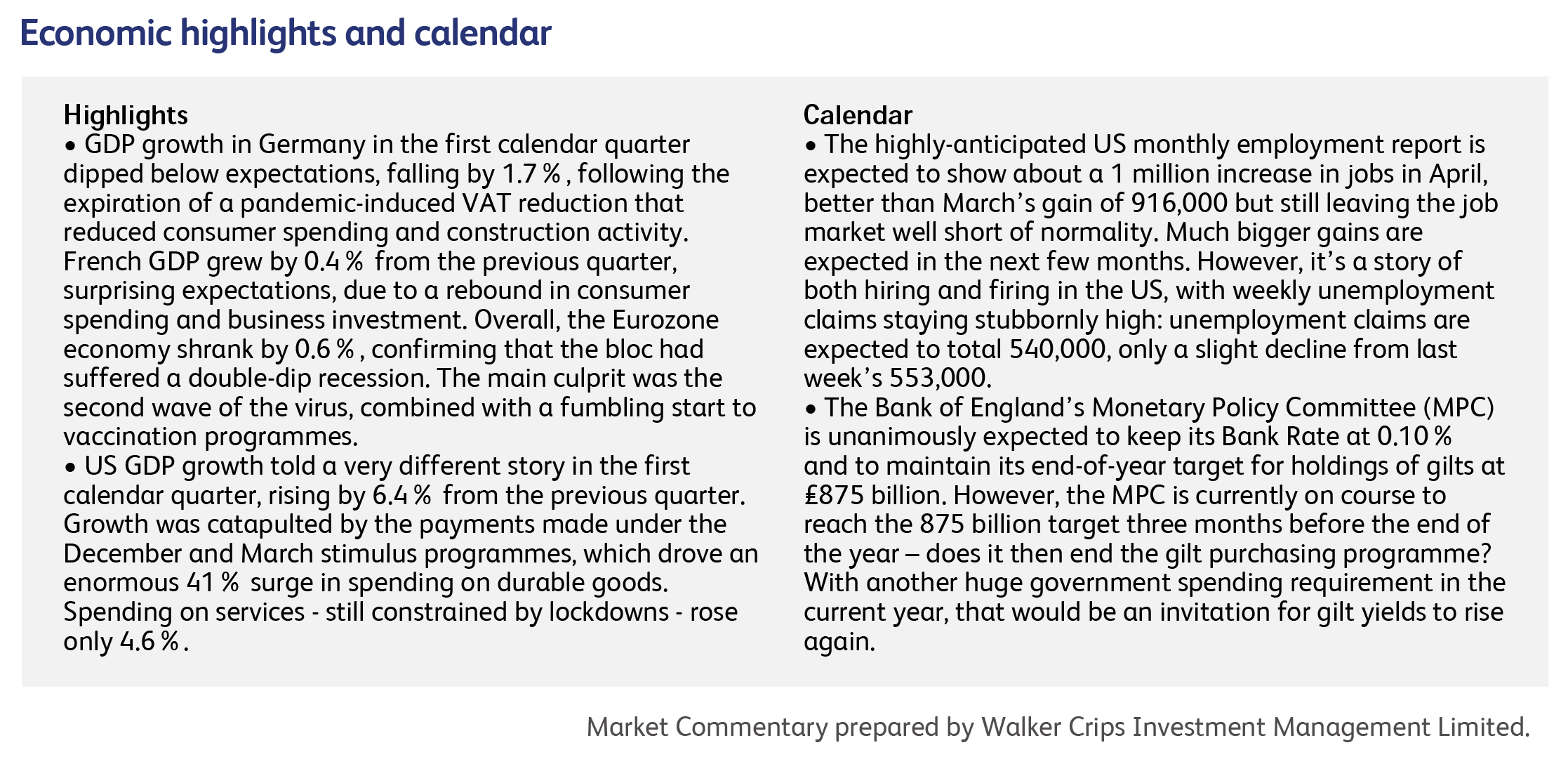
4 May 2021
With the announcement of the $1.8 trillion American Family Plan, following so quickly on the heels of the $2.3 trillion American Jobs Plan and the $1.9 trillion COVID-19 Stimulus Package, President Biden is taking advantage of a narrow window of political opportunity: such is the frequency and rate of change in American elections that this probably marks the culmination of his legislative agenda.
The President is also attempting to cement the government’s position as the driving force behind the economy, something which was necessitated by the pandemic but is increasingly becoming the norm around the world. Collectively, the US stimulus programmes add up to $6 trillion, equivalent to about 17% of current GDP (although much of the spending will be spread over the next 10 years). The “NextGenerationEU” recovery fund is not quite on the same scale but, at €750 billion, it would still represent about 7% as a share of this year’s GDP. And it certainly matters: the Spanish government has already spent some of the money in anticipation of receiving EU funds later this year; and, when the Italian Prime Minister Mario Draghi unveiled plans to spend the money from the fund last week, along with another dollop of domestic stimulus, he claimed that the "destiny of the country" was at stake. We also know, from the British government’s recent borrowing estimates, that government borrowing this year is likely to reach 10% of GDP, following on from last year’s post-second world war record of 14.5%.
This represents a major departure in fiscal policy for much of the western world, and has been made possible by the confluence of several monetary, economic and political trends. For a start, central banks have spent the past decade proving to politicians that they can suppress government borrowing costs by purchasing mindboggling amounts of government bonds. Having been sceptical coming out of the Credit Crunch, politicians of all stripes now feel more assured that they have an open cheque book; the only question is what to use it for.
The main economic trend of the last decade has been the slowing of growth, accompanied by the development of new technologies that threaten the job security of vast swathes of employees in the service sector. The big, recent economic development has been the pandemic, which gave governments the excuse to unleash all their firepower, breaking the fiscal norms of the past few decades. Finally, the era of unfettered globalisation has come to an inglorious end, accused of the hollowing-out of manufacturing towns, wage stagnation, increasing social and wealth inequality and, in the US, lower life-expectancy. The aspirations of too many voters have been frustrated, and a brand of populist politics has arisen that prioritises domestic stakeholders over the benefits of free trade and open borders. That most likely means slower economic growth, with government debt being required to plug the holes - and reward favoured voting blocs.
Unlike the pandemic expenditure, President Biden’s latest stimulus would be paid for, explicitly, from taxes on corporations and the very wealthy. Capital markets have been lulled into complacency by the tidal wave of money unleashed by the pandemic; they may wake up to find that European-style, social-democratic fiscal policies mean a bigger share of the pie for government, and a smaller share for corporate profits.

Sainsbury's reported a £261 million pre-tax loss for the year, despite an 8.1% increase in like-for-like sales. The swing to loss was blamed mainly on pandemic-related costs, which amounted to £485 million, as the company invested in online and home-delivery operations. Competition from cheaper European rivals is likely to cap the ability of Sainsbury’s to generate significant revenue growth from its physical supermarket locations but, fortunately, neither Aldi nor Lidl currently offer home delivery. Meanwhile, the ominous spectre of Amazon, which entered the UK grocery business last year, looms over the entire industry.
Google’s search business made a comeback in the first calendar quarter, as its parent company Alphabet announced a surge in advertising revenues linked to spending on travel and retail. It seems that businesses are boosting their spending on digital marketing, keen not to miss out on the spending splurge that will accompany the end of lockdowns. The shares rose as much as 6% on the news, and are up 34% year-to-date.
Berkshire Hathaway Inc. hosted its Annual Shareholders Meeting over the weekend, with Warren Buffett and Charlie Munger, flanked by Greg Abel and Ajit Jain, answering shareholder questions for over 3 and half hours. Although not formally announced during the meeting, Charlie Munger, when asked about the importance of Berkshire's culture noted that "Greg will keep the culture", suggesting Greg Abel is to succeed Warren Buffett as CEO. And on Monday, CNBC reported that Mr Abel was next in line for the CEO role. The question of who would succeed Warren Buffett has lingered over the firm for decades, and seems to finally have been answered.

This publication is intended to be Walker Crips Investment Management’s own commentary on markets. It is not investment research and should not be construed as an offer or solicitation to buy, sell or trade in any of the investments, sectors or asset classes mentioned. The value of any investment and the income arising from it is not guaranteed and can fall as well as rise, so that you may not get back the amount you originally invested. Past performance is not a reliable indicator of future results. Movements in exchange rates can have an adverse effect on the value, price or income of any non-sterling denominated investment. Nothing in this document constitutes advice to undertake a transaction, and if you require professional advice you should contact your financial adviser or your usual contact at Walker Crips. Walker Crips Investment Management Limited is authorised and regulated by the Financial Conduct Authority and is a member of the London Stock Exchange. Registered office: Old Change House, 128 Queen Victoria Street, London, EC4V 4BJ. Registered in England number 4774117.
Important Note
No news or research content is a recommendation to deal. It is important to remember that the value of investments and the income from them can go down as well as up, so you could get back less than you invest. If you have any doubts about the suitability of any investment for your circumstances, you should contact your financial advisor.